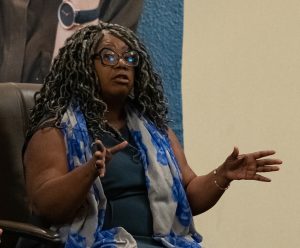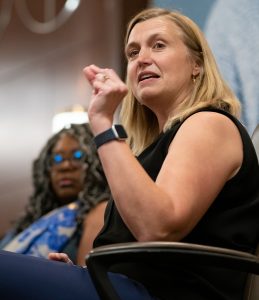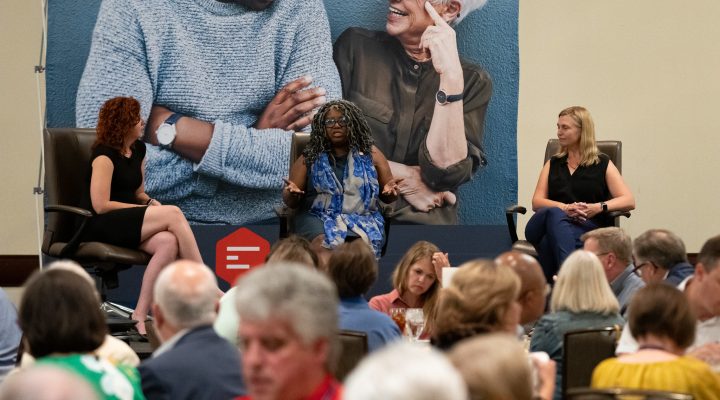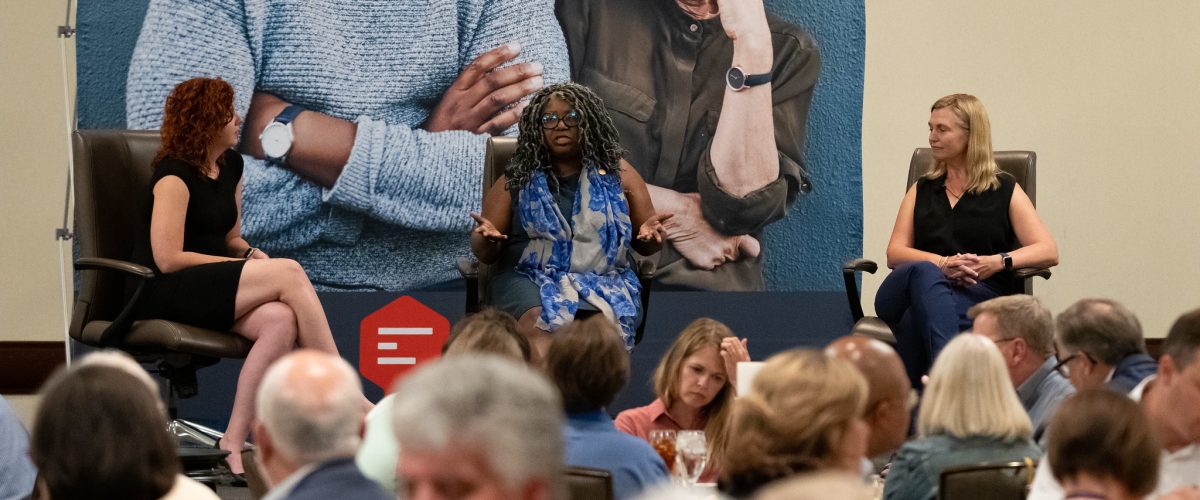“Race and gender and patriarchy always go together,” Beth Allison Barr said at the outset of a lively conversation with Anthea Butler during the Friends of BNG dinner June 30 in Dallas.
Barr, a history professor at Baylor University and author of The Making of Biblical Womanhood, dialogued with Butler, chair of the department of religious studies at the University of Pennsylvania and author of White Evangelical Racism: The Politics of Morality in America. Their conversation was moderated by BNG board member Erica Whitaker, associate director of the Institute of Black Church Studies at Baptist Seminary of Kentucky and a member of Empower West, a coalition of Black and white pastors dedicated to education and economic development in west Louisville.
The fast-paced dialogue covered a wide range of historical and theological topics over the course of an hour.
‘We have to talk about oppression’
Looking back at the last 400 years of American history should force white Americans to confront their ancestors’ subjugation of African slaves, Native Americans and of women — including white women, Butler said. “We have to talk about oppression. American has a patriarchy problem.”
Christians also must ask themselves how and where they are continuing that oppressive behavior today, she said. “Are you helping structures that hurt people, or are you trying to build something new?”
“Are you helping structures that hurt people, or are you trying to build something new?”
Whitaker led Barr and Butler through an exploration of the roles played by church and faith in propagating discrimination and oppression against women and people of color, and ways that white Christians can begin to deconstruct racist belief systems.
The time is now
Butler said the time is now for white Christians to denounce and dismantle the ideologies, mythologies and theologies that fashion a God and Christianity in their own image and continue to defend systems of racism, injustice and patriarchy.

Anthea Butler
“You have to speak up. Silence is complicity. When you see injustice, you need to speak up. If you are silent, you are agreeing” with the oppression, she said.
A starting point is to delve into the history of oppression that is under attack by conservatives bent on denying the historicity of slavery, systemic racism, patriarchy and other forms of persecution, Butler explained. Doing so also can counter the false nostalgia many Americans have for an idealistic past that never really existed.
Historical study exposes long-standing stereotypes — such as Black men as rapists — that justify the attitudes and behaviors of discrimination, she said. “When we sacralize something that’s not real, you buy into the lie and feel OK with everything that’s going on.”
“When we sacralize something that’s not real, you buy into the lie and feel OK with everything that’s going on.”
Barr suggested pairing the uncomfortable facts of current oppression with ancient historical trends that often feel less threatening. For example, an account of a second century Roman noblewoman murdered by her husband, who then was pardoned by the emperor, can be the starting point for honest discussions about modern-day patriarchy, she said. “Then we can ask: How are we still complicit in supporting these structures?”
Current patterns of oppression
Whitaker asked the panelists to describe some of the prevalent patterns of oppression they see in society and church.

Beth Allison Barr speaks, with Anthea Butler in the background. (CBF photo)
Barr quickly identified sexual abuse as among the most pressing historical and ongoing trends, adding the problem is not limited to congregations that adhere to complementarian teachings. The propensity “to see women as less than men” is widespread throughout the church — and nothing new. “What changes is how we justify it.”
Butler unleashed a torrent of criticism at Texas Gov. Greg Abbott and his allies for seeking to criminalize parental support of LGBTQ children.
She also lamented “the way the LGBTQ community is being cut down right now” in the U.S., comparing it to the vilification of gay and lesbian people during the AIDS epidemic.
That development further signals the rise of authoritarian and theocratic rule in the U.S., Butler warned. “And just because you’re Christian, you’re not exempt. The church must understand that when you allow them to come for these communities, they are going to come for you next. Things are going to start getting ugly.”
“The church must understand that when you allow them to come for these communities, they are going to come for you next.”
But it doesn’t help that Christianity itself is complicit in the ongoing crisis of discrimination and violence, she added. “And do we even have a church right now? That’s up for grabs.”
Talking about oppression and false gods is an especially relevant question in the Lone Star State, Butler said. “The gun is God in Texas. God is not God.”
She urged Christians to find ways to speak up about injustices and the attitudes that spawn them, and to root out biased literature within their churches. Christians also must read theologies and other writings “outside your canon” and delve into the histories of people of color.
Ask questions
One powerful action is to simply ask questions, Barr added. For example, if Martin Luther King Jr. was right about Sunday morning being the most segregated hour in America, “ask why and get people in your congregations to ask why.”
Also, learn to read Scripture from different perspectives, Barr advised. “If white Christians read Black female theologians, we wouldn’t be in this position now. So, see through the eyes of someone who is not like you.”
Yet, breaking free from the tropes and myths that prop up white supremacy is difficult for whites who, sometimes subtly, believe they are God’s chosen “and don’t want to upset that,” Butler said.
That worldview is evident in the images of a white Jesus commonly seen in so many churches and Christian publications, she added. “We have made God in our own image.”
Much of Christianity also has created a male God, which has not always been the case throughout world history, she said.
In the U.S., God tends to share the angry, judgmental and militaristic characteristics that define much of the society, Butler said. “The idea of God most Americans love is the Old Testament God who kills those you don’t like.”
“The idea of God most Americans love is the Old Testament God who kills those you don’t like.”
But it is whites themselves, and especially white men, who must participate in undoing the structures of racism and injustice, she said. “We are at the moment when patriarchy has to be dismantled by the people who benefit from it.”
Churches worried about losing attendance if they take on these issues should remember faith is not about maintaining membership rolls, Barr said. “The church has always survived, and it has changed dramatically over time. It’s not about saving the church, it’s about the gospel of Christ, which has continued despite all the damage we have done to it.”
Watch a video of the entire program here.
Related articles:
Now Beth Moore is taking on patriarchy in the church
I teach the things Republican legislators are trying to outlaw; here’s what we actually teach | Opinion by Susan Shaw


